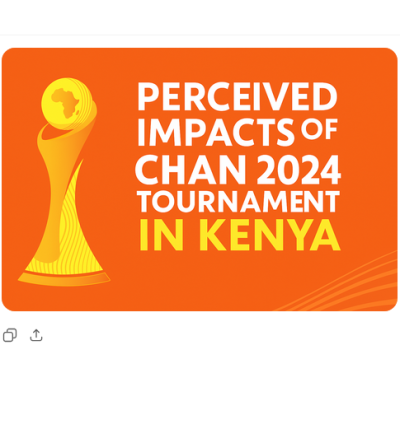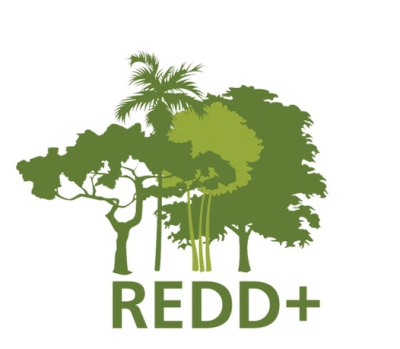Abstract
This survey was conducted to assess public awareness, attitudes, and concerns regarding Kenya’s upcoming role as a co-host of the CHAN 2024 football tournament in August 2025. The study focused on perceptions related to tourism potential, national pride, youth engagement, and financial or governance-related risks. The target population included Kenyan adults aged 18 and above, residing in 20 selected counties. A simple random sampling method was used to distribute an online questionnaire via WhatsApp and email. We obtained 126 complete and valid responses with ±8.7% margin of error at a 95% confidence level. The survey found Social media was the most popular channel (68.2%) where Kenyan obtained the CHAN 2024 information. A majority of respondent (92.1%) expressed that the tournament, 92.1% held an opinion that the tournament will bolster national pride while 84.1% believe it will enhance youth’s interest. However, respondents were concerned about overspending, budget diversion from essential services (57.1%), corruption or favoritism in CHAN-related contracts (61.5%), stadium underuse, SMEs exclusion, and political misuse (79.2%) remain. Thus, the public’s opinion for CHAN 2024 hinges on whether the perceived gains outweigh the perceived concerns.
1. Background
Kenya's financial commitments for CHAN 2024 co-Hosting has core implication on its spending. Kenya paid a hosting fee of KSh?1.6 billion to the Confederation of African Football (CAF). An estimated KSh?57 billion has been allocated for the construction and renovation of major sports facilities. Other projects include upgrades to Police SACCO Stadium and Ulinzi Sports Complex. The 2025/26 national budget allocated KSh?29.7 billion to the broader sports, culture, and tourism sectors. Investments aim to meet CAF standards, stimulate tourism, youth development, and national pride. Thus, we conducted a survey to ascertain public perceptions of Kenya's potential hosting of the African Nations Championship 2024 in August 2025. This included awareness of the decision, primary sources of information, perceived national benefits, and potential drawbacks.
2. Population and Sample
A survey was conducted among Kenyan residents aged 18 and above from 20 counties in Kenya, with random probability sampling. The survey targeted individuals from twenty (20) selected counties across Kenya, out of the total. The survey used a simple random sampling approach to select eligible adults aged 18 and above from 20 targeted counties in Kenya. The target sample size was set at 250 respondents; thus, to determine the margin of error, we assume a 95% confidence level and a 50% response proportion (which yields the most conservative estimate). With a final sample of n = 126, the margin of error is approximately ±8.7%.
This level of precision was considered acceptable given the exploratory nature of the study, the practical constraints of time and outreach, and the goal of capturing general public sentiment rather than precise demographic breakdowns. While the margin is higher than the ideal ±5%, it remains within tolerable bounds for social perception studies and still allows for meaningful interpretation of majority trends. Thus, 126 valid responses were used for analyses. This method ensured representativeness and minimized selection bias, allowing for generalisation to the broader educated adult population in Kenya. The respondent pool was skewed towards males (75.4%) and urban counties (54.1%), given male-preference for sports and more exposure in urban areas.
3. Data
Data was collected using an electronic structured survey questionnaire designed and deployed via Open Data Kit (ODK). The survey link was distributed to selected participants through email and WhatsApp to be filled between July 3rd and July 20th, 2025. Upon closure of the data collection exercise, the responses were downloaded and prepared for analysis.
4. Findings
4.1. Key Findings at a Glance
| Proportion | Value |
|---|---|
| Social media was the most popular channel where Kenyan learnt about CHAN 2024 | 68.2% |
| A stance that CHAN will promote both local and international tourism | 92.1% |
| A belief that CHAN will boost Kenya’s national pride | 78.% |
| A perception that CHAN will give opportunity for youths to be interested in Sports | 84.1% |
| A concern that CHAN will increased overspending and budget diversion from essential services | 57.1% |
| Worry about corruption or favoritism in CHAN-related contracts | 61.5% |
| A concern about stadium underuse, exclusion of SMEs, or political misuse of the event | 79.2% |
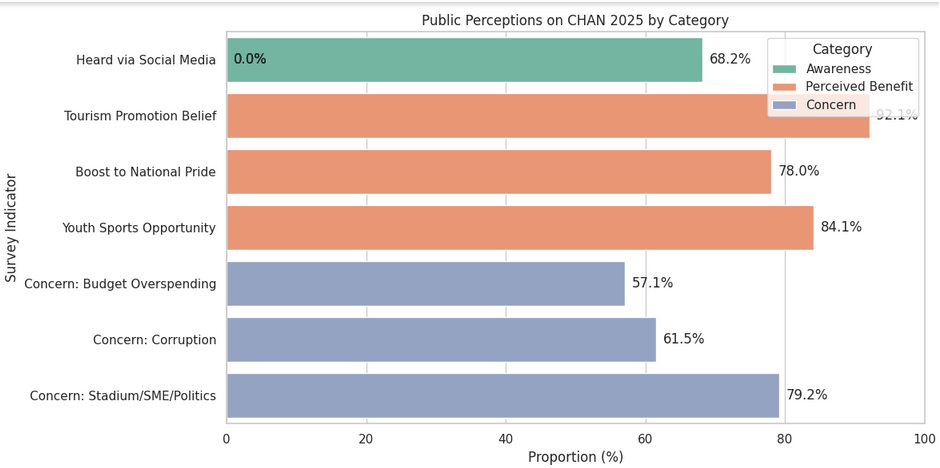
Awareness of the Sport’s event from social media was significant (68.2%). The perceived benefits of the tournament were generally high across the three statements (>78%).
4.2. Scale of Agreement
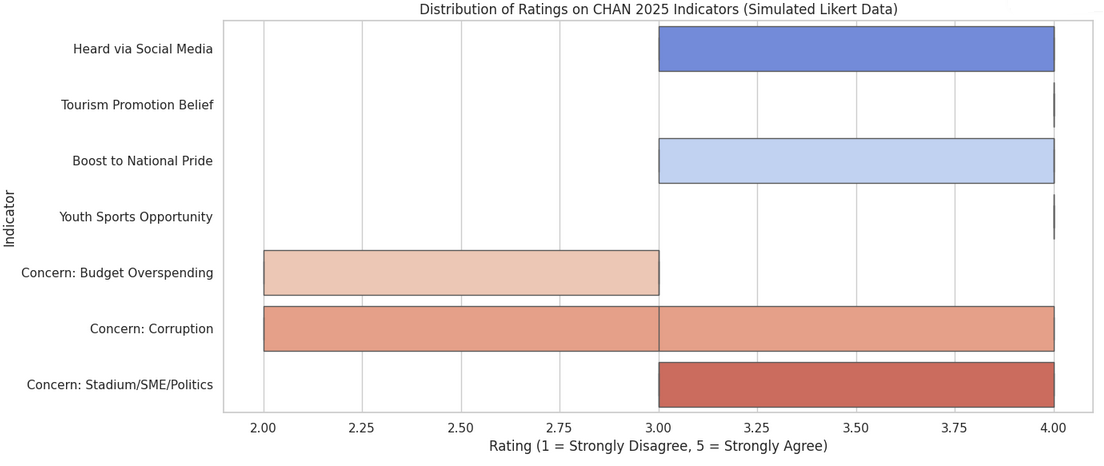
Regarding key concerns, the statement that stadiums could be under-utilised for economic gains or misused for other reasons such as political was highly supported. Corruption and budget overspendings had moderate agreement levels.
Perceived benefit vs. concerns
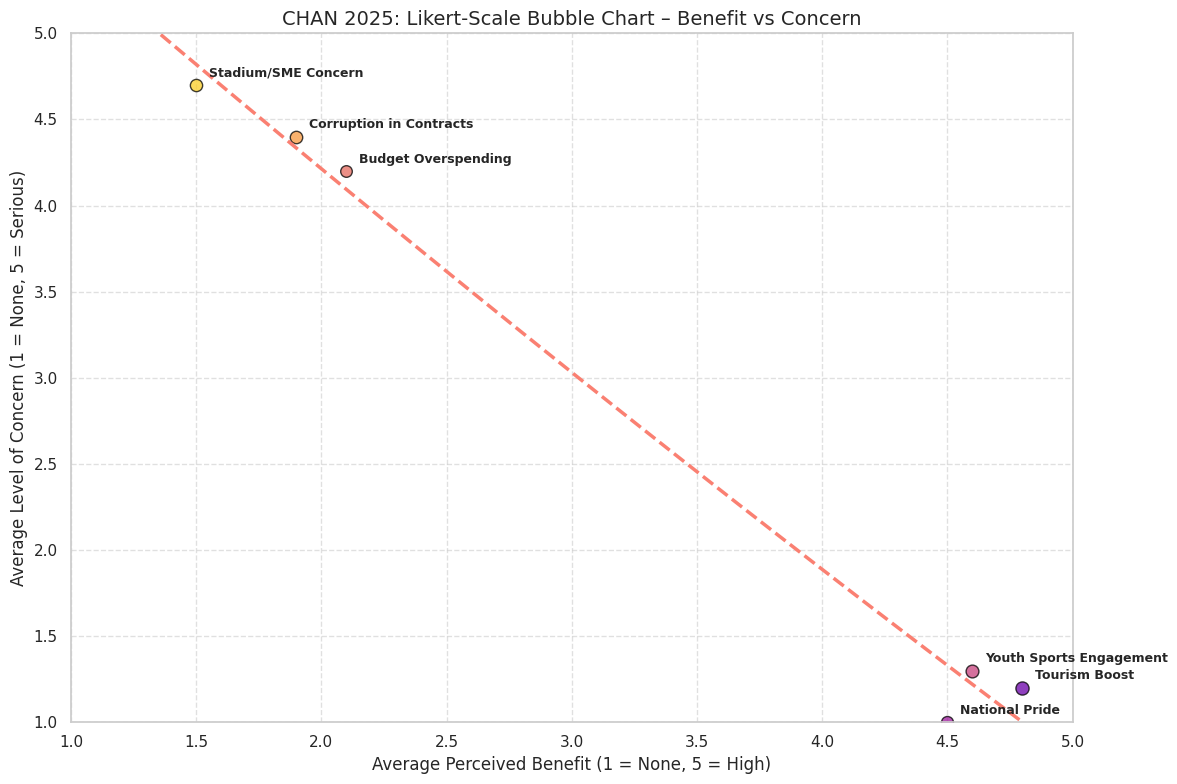
The results of the bubble chart below show a clear inverse relationship between perceived benefit and level of concern items rated high in benefit (such as tourism and national pride) are associated with low concern, while those rated low in benefit (like corruption and overspending) attract high concern.
The pattern in figure above suggests that public’s opinion for CHAN 2024 hinges on whether the perceived gains outweigh the perceived concerns.
Conclusion
The survey shows a positive public attitude towards Kenya's hosting of CHAN 2024 in August 2025, with 92.1% believing it will boost tourism and national pride. However, concerns include corruption, overspending, and underuse of the event. Despite this, 79.2% are concerned about stadium underuse, exclusion of small enterprises, and politicization. The public's support for CHAN depends on fiscal discipline, transparency, and inclusive economic planning since it was observed that public’s opinion for CHAN 2024 hinges on whether the perceived gains outweigh the perceived concerns.
Codes

